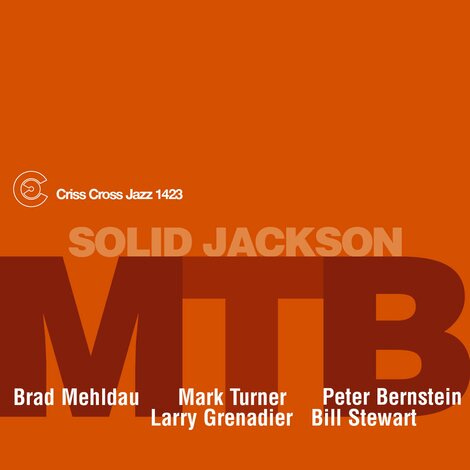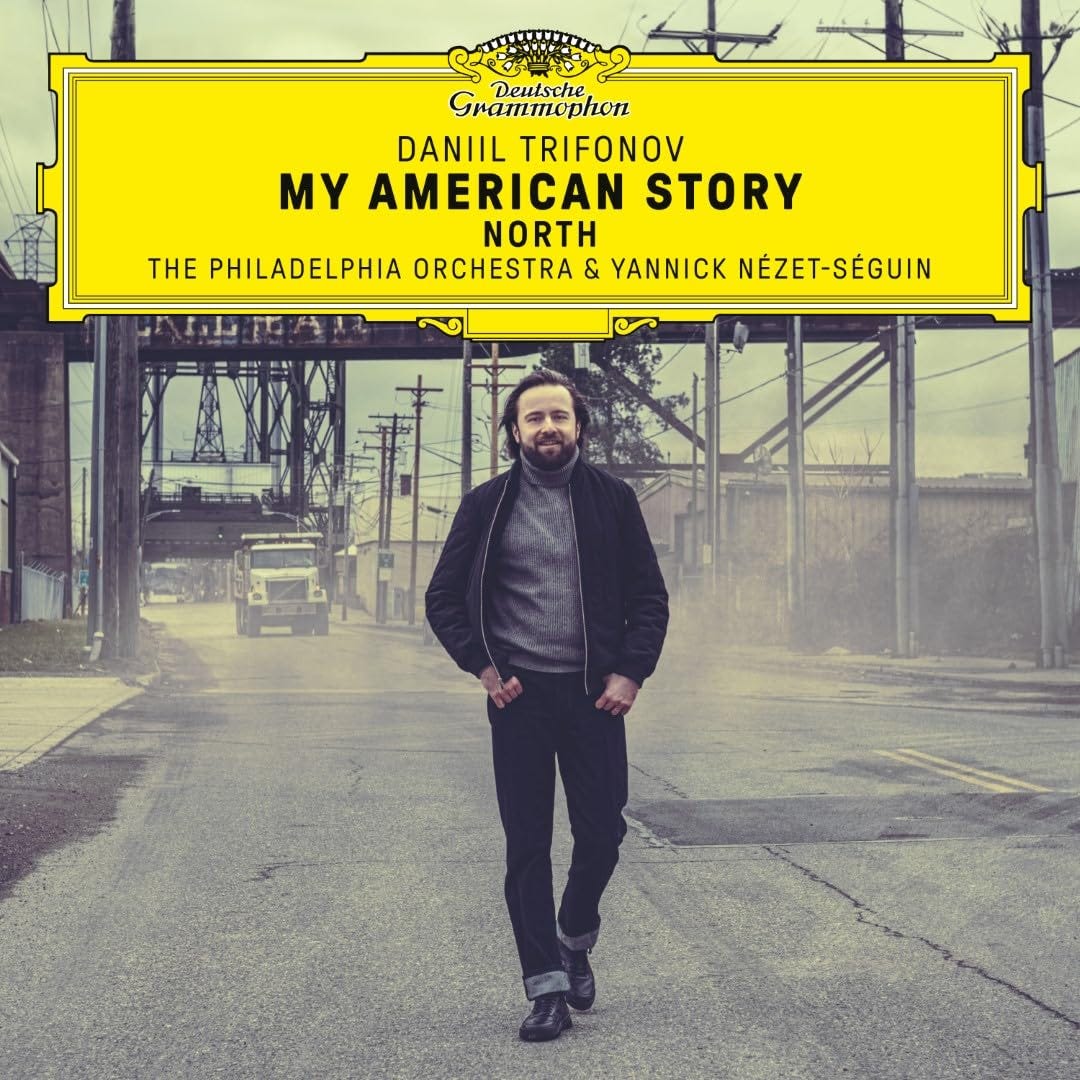TT 471: Brad Mehldau, Jason Moran, Kurt Rosenwinkel, Marc-André Hamelin, Daniil Trifonov
Quick notes on five new albums
Brad Mehldau is 54, Jason Moran is 49. In addition to being two of the greatest, they are also near-antipodes: Mehldau is in one lineage with Wynton Kelly, Bill Evans, and Herbie Hancock, Moran is in another with Thelonious Monk, Andrew Hill, and Geri Allen.
When I first saw the cover of M.T.B Solid Jackson, I thought it must be an archival release of something recorded 25 or 30 years ago, from back when I’d see these very musicians in various configurations at Smalls, Augie’s, or the Village Gate. However, it turns out these old friends tracked this gem for Criss Cross in November of last year.
It feels like Mehldau is wanting to stay connected to the scene. He’s arguably the most successful pianist of his generation (he also deserves to be) and could easily just play big concert halls trio, or even those same big halls solo. But, to his credit, he’s still ready to get down with his peer group in a humble jazz context.
The title piece is a sophisticated blues by Mehldau. “Solid, Jackson!” is something Charlie Haden would say all the time, and the Haden reference is one cue for how to listen to Larry Grenadier and Mehldau navigate harmony together.
Mehldau and Grenadier have a thing; Peter Bernstein and Bill Stewart have also formed a language together, creative yet always traditional. Check out that melding of guitar and ride cymbal on Bernstein’s “Ditty for Dewey.”
Mark Turner is perhaps the X-factor, a unique kind of free agent. You know what he’s gonna do, but you also don’t. In his quiet way, Turner is still surprising.
With the Bandwagon, Jason Moran leads one of the great groups of the era; he’s also gone on to be a significant curator, and even has a foothold in the world of fine art. Thankfully, Moran has always been keeping his hand in as a player with others, and shows up as a sideman in both expected and unexpected places.
Like Solid Jackson, Walter Smith III’s Three of Us Are From Houston and Reuben Is Not references a moment 25 or 30 years ago. There is a certain powerful scene from Houston connected to the Kinder High School for the Performing and Visual Arts and even to a specific teacher, Robert “Doc” Morgan. Smith’s “Cezanne” is not a tribute to the painter, but rather the name of the Houston club where most of the band played early gigs.
The musicians on Three of Us Are From Houston are approximately one short generation younger than those on Solid Jackson. Eric Harland and Reuben Rogers probably would have checked out Bill Stewart and Larry Grenadier; certainly Walter Smith knows something about Mark Turner. (Jason even knows something about Brad, although it is not obvious.)
If Solid Jackson seems sort of like an alternate history, then Three of Us Are From Houston is pedal-to-metal here and now, the latest conception from the thought leaders. It is a band of wonderful players, but I have to give special props to Moran, who has figured out how to be genuinely surreal and relaxed within this tightly-composed modern concept.
My current favorite Smith III tune is “Office Party Music,” a melodic gem that has something of indie-rock about it. Moran sounds great; it would also be interesting to hear what Mehldau would bring to this particular “Party.”
On Solid Jackson the somewhat obscure repertoire pieces are by Hank Mobley, Wayne Shorter, and Harold Land. On Three of Us Are From Houston the band plays “Point of Many Returns” by Sam Rivers.
Rumors of bootlegs persisted for years, and finally there’s an official document: Kurt Rosenwinkel, the Next Step Band, Live at Smalls 1996.
Is it really coming up to 30 years ago? I heard them a lot in person, so did Reid Anderson, and a great deal of what Reid and I played in The Bad Plus together was in direct response to this band and Kurt’s tunes for this band. When I put the personnel of the Billy Hart quartet together in 2004, it was Billy, me, and half of the Kurt Rosenwinkel quartet.
Piano gods are one world, guitar gods are another. Rosenwinkel is a guitar god, and that also means “fusion.” When I saw the Next Step reunion at the Vanguard earlier this year I suddenly realized this book of Rosenwinkel tunes was actually not so far from people like Joe Zawinul or Allan Holdsworth. But it was impossible to play fusion with Mark Turner, Ben Street, and Jeff Ballard. Ballard, in particular, has never played any fusion in his life. Instead, his drums reference earthy world musics and esoteric jazz magicians like Donald Bailey.
This music was unique and gorgeous. I’m not sure if this particular set from this particular night at Smalls in 1996 is the best the band ever played — the studio record of The Next Step is from 2000, so that means they were playing all of 1997, 1998, and 1999, and getting better every gig — but it’s still great to hear them once again. “Alpha Mega” is my favorite, I have complained to Kurt for decades about how there wasn’t a recording of “Alpha Mega” for me to listen to. It now exists at last.
Brad Mehldau steps in for a killer piano solo on “Zhivago.”
If you get interested in Beethoven, you get interested in the Hammerklavier. It’s the longest, fanciest, and most absurd Beethoven piano sonata.
At one point I audited recordings by Emil Gilels (both studio DG and live on Melodiya), Rudolf Serkin, Maurizio Pollini, and others. Eventually I decided — with the outsized arrogance of youth — that I didn’t like the piece all that much. Of course it is monumental, exciting, genre-busting, blah, blah, blah. But, as much as I love the avant-garde, genuinely experimental music of epic dimension is rarely my thing. I prefer modest containers filled in perfectly idiosyncratic ways.
The world owes a debt to Marc-André Hamelin for his tireless championing of worthy music overlooked by most. Nobody has a richer discography than Hamelin. Now, in his early sixties, the great pianist makes his first Beethoven record, starring the Hammerklavier.
I just love it! Hamelin can treat the Hammerklavier with a relaxed equanimity. I can almost hear him saying quietly before beginning, “This is not so hard, really.” Hamelin would never try to undo Beethoven’s most outrageous ideas, the sforzandos in the wrong places, the ornamentation that goes nowhere, the surreal two-handed scale and tremolo, the thicket of fugal counterpoint. Hamelin doubles down on all that stuff.
After recording definitive versions of Alkan, Godowsky, Busoni, Scriabin, Medtner, and so much else, the Hammerklavier is just another long weird piece for Hamelin. Perfect. Truly: a perfect record.
The pairing is the earlier and more normal Beethoven showpiece, Op. 2 no. 3 in C major, which is also wise and wonderful.
(Trivia: The previous releases of both Marc-André Hamelin and Brad Mehldau were of Gabriel Fauré.)
Classical music is frequently organized and marketed by country. French music, German music, Russian music, English music, Italian music, and so forth.
Danil Trifonov’s latest is a substantial 2 CD set, My American Story: North.
According to the press release:
Trifonov retraces his immigrant’s journey in the “New World”, through American piano scores ranging from jazz and swing to modernism, minimalism and popular soundtracks.
Art Tatum I Cover the Waterfront
George Gershwin Concerto in F
Aaron Copland Piano Variations
Bill Evans When I Fall in Love
John Adams China Gates
John Corigliano Fantasia on an Ostinato
Dave Grusin “Memphis Stomp” from The Firm
Thomas Newman Theme from American Beauty
Mason Bates Piano Concerto
John Cage 4’33 (Field Version)
It’s a big project and objectively very good — although the one piece of new music on the album, the piano concerto by Mason Bates, is actually pretty bad. The famous piano soundtrack to the old movie On Golden Pond was Dave Grusin in a Keith Jarrett mode, and this Mason Bates concerto sounds like On Golden Pond arranged by Alberto Ginastera. (To be clear, I like Jarrett, Grusin, and Ginastera, I just don’t like this mélange Bates has made.)
It’s always great to hear a fresh version of the Copland Variations and the Corigliano Fantasia on an Ostinato; Trifonov plays them superbly. The Gershwin and Adams are also just as they should be.
But what about these Tatum and Bill Evans transcriptions? I’m frankly perplexed by this sort of thing, which has been happening more frequently of late.
Tatum, almost four minutes from 1953.
Trifonov, almost three minutes of transcription of the 1953 performance, starts with high-register chords going into second chorus.
Trifonov and other classical professionals should definitely learn jazz transcriptions. They should then put that experience straight into their performance of classical music. (Presumably Trifonov is indeed already doing this, and for example displays a nice feel on the pulsating notes of John Adams China Gates.) But placing a Tatum transcription first as the sounding bell for a complex program doesn’t feel quite right; it would be easier to swallow as an encore, at a gala, or as a party piece.
Trifonov is a star, and this album is called My American Journey. It is leaning into the cult of the performer in a particularly postmodern way, complete with a cover photo of the pianist wearing jeans in front of a dump truck. “Look! I can play serious music, I can commission music, I can play film themes, I can transcribe and play jazz, I can even dabble in experimental sounds like John Cage!”
It might have been more truly artistic if Trifonov had relented and taken his place as just another good recitalist, using his platform to simply program other serious notated American pieces alongside the Copland and Corigliano. (I’ve got a long list.)
Of course, it takes effort from a full staff to achieve and maintain a major concert career, and it’s quite possible that DG wouldn’t even accept such an uncommercial project from their star. Viewed from the angle of compromise, the My American Story conceit does offer a heartfelt and polished spectrum of American possibility, a concept that may still be new to some.








I heard Kenny Barron with his great trio last night. I was jammed in the one bar seat against the village vanguard's back wall which isn't actually at the bar, but between the last barstool and the banquette.
An older woman, smartly dressed with a friendly manner, sat down at the last banquette seat. In a very funny and old school Brooklyn way, she was annoyed with herself because she walked west at the hospital on 7th ave instead of South, and was almost late. She said "I've been coming here for a hundred years! My husband used to play here!".
Turns out, I was seated next to Cedar Walton's wife. She'd avoided the vanguard, particularly this time of year. Cedar used to play Christmas week. She was a riot.
Kenny was a riot too. How is that man 81 years old? Kiyoshi is a harmonic rock and took some very beautiful solos. Johnathan Blake's drumming had so much variety, from swing to latin to real dirty funkiness at times.
They played a tune called "Canadian Sunset" by Eddie Heywood. I'd never heard it. It's lovely! What a tune! I'm transcribing it so that I can annoy my bandmates at a future jam with demands to play it.
merry christmas, happy hanukkah, happy new year!
I feel about Mehldau the way the critic John S. Wilson felt about Bill Evans. And as big admirer of Evans, I know that must be wrong, but despite having attended two Mehldau performances and purchased several albums I just can't get past feeling that his playing/composing is insufferably portentous. Perhaps someone can point me to a recording that would change my view, or maybe the one Ethan Iverson recommends here would. I'd happily be proven wrong.